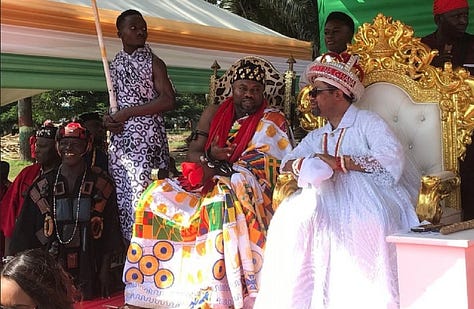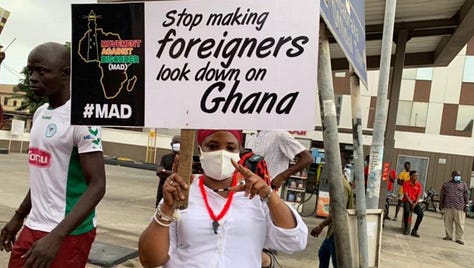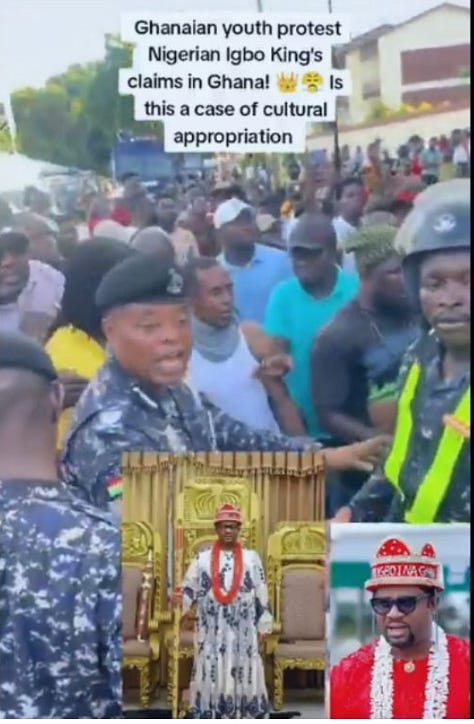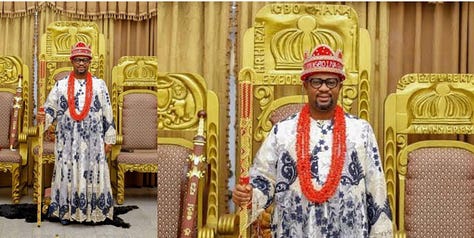Igbo Kingdom of Commotion
(Igbo Arrogance, Ghanaian Xenophobia, and Our Collective Pan-African Shame)






(For serious Pan-African activists and writers, the tragedy of Africa is that we appear as a people who take ten steps backward for every step we take forward. In this article, my colleague and Ore mi, C. Y. Andy-K, teamed up to focus on this unfolding saga in Ghana.)
It galls greatly that while we read how the Chinese recently shattered physics by refueling a satellite in space, many Africans are prancing around, with toga of primordial ethnocentricism draped on their shoulders, baying for the blood of their fellow Africans over the action of a few misguided fools who believe that conjuring faux kingdoms is the best way to compensate for their sense of low-esteem and inferiority complex inflated by notions of wealth and archaic and false religious obscurantism of being Yahweh’s own chosen ethnic group, one of such untutored claims some poorly educated Africans have embraced.
It is a shame.
We have to repeat the question Femi asked that provoked many of his Igbo contacts to block and unfriend him: why are some of our Igbo brothers so determined to stain the name of the Igbo nation—and by extension, Nigeria - wherever they set foot?
Is it sheer arrogance? Or a misdirected inferiority complex wrapped in a chosen person's flamboyance of cultural hubris? Or is it the old colonial hangover of hustling at all costs, even when the dignity of a people is on the line? Do they honestly believe that they are the original Jews or Hebrews chosen by Yahweh, totally oblivious of the fact that Jewish scholars had renounced their rabbis being responsible for the Talmudic Interpretation of certain biblical verses used to justify the enslavement of we Africans, racist writings some ignorant Africans not educated on the subject are now coming into contact with and using to claim they are Hebrews, too? This, at a time when the scions of the racists who started those myths had long rejected them and embraced the scientific fact that all humans and languages originated from Africa, not from any Garden of Eden or Tower of Babel?
The questions are many because how else can one explain this latest absurdity—the galling, infantile, fanciful and frankly suicidal attempt by one Igbo gentleman (and we use that word with extreme reluctance here) to establish an Igbo kingdom on 50 acres of Ghanaian soil?
The story has since taken off, with our money-miss-road type man reportedly trying to crown himself His Royal Highness of the United States of Igbo Ghana.
As in, form a state within a state! That is sheer effrontery and madness, and we know that!
We must call madness by its name. It is not Pan-Africanism; it is not culture, it is delusion, or, more worryingly, the behavior that provokes entire communities into confrontation.
We must ask how this could have happened without the self-proclaimed King’s advisers cautioning him? How could this be thought of, for people who do not have kingship as part of their culture?
Did our Elders not admonish us that if we fail to stop our neighbour from consuming poisonous substances, their cries of anguish would keep us awake at night?
We say this with the full weight of history and personal warning as a guide.
Years ago, Femi asked pointedly in an article: “What exactly do the Igbos want?” He did not write it to mock or antagonize. He wrote it to caution. He noted then - painfully and honestly—that while Igbos are some of the most industrious and brilliant people on this continent, there exists within a subsection of the Igbo Diaspora an unfortunate and often counterproductive tendency to project dominance instead of humility, exclusiveness and entitlement instead of integration.
He said, “You cannot claim to be oppressed and yet carry yourself as the conqueror of every land you set foot upon.” You cannot cry marginalization in one breath and, in the next, impose your royal titles, tribal colors, and brash behavior in a land that is not yours.
Have we learned nothing from history?
Let us revisit the ugly chapters we often pretend never happened— no apology to those who may call it washing dirty linen in public. We are not in the image laundry business as polemicists. We are in the naked truth business. There is no integrity in calling out and cussing imperialism and racism while we romanticize our shortcomings in Africa.
Let us name five countries where this same pattern of reckless behavior has landed Igbos—and, tragically, Nigerians at large—into hot soup:
* South Africa: The incessant tribal chauvinism of claiming to be the “Jews of Africa” while mocking the hosts’ “laziness” sparked anti-Nigerian sentiments, worsened by some Igbos’ involvement in cybercrime and drug trafficking. Nigerians, including decent ones, have been burned out of their homes, beaten, and even killed.
* Malaysia: For a long time, Igbos—especially those posing as “businessmen” with mysterious income sources—became synonymous with Internet fraud and romance scams. The Malaysian immigration crackdown in the 2010s disproportionately targeted Nigerians as a result.
* India: Police routinely raid Nigerian enclaves, and most of the arrested tend to be Igbos, caught with expired visas, narcotics, or entangled in all manner of shady deals. There’s even a derogatory term in parts of India: Nigerian = fraudster.
* Turkey: Nigerian passports are practically a red flag now. Immigration officials treat all Nigerians like pariahs. Why? A mix of overstaying, illegal business, and the occasional drug mule—and again, disproportionately linked to our Igbo brothers.
* China: Need we remind ourselves that the Guangzhou authorities had to set up special policing units for Nigerians? And, of course, there were the videos of Igbos resisting arrest, fighting Chinese police officers, and screaming racial injustice, while ignoring their disrespect for local laws and space.
In “What Exactly Do the Igbos Want?” Igbos were urged to stop measuring dignity in the size of their cars, the thickness of their gold chains, and their bank accounts. They were begged for introspection, self-restraint, diplomacy, and the embrace of quiet dignity rather than theatrical dominance.
Yet here we are in Ghana, a land that has shown enormous hospitality to Nigerians, having to watch a one-person circus mock over a century of Pan-African aspirations and the march towards a common African market by declaring a “United States of Igbo Ghana,” or whatever such nonsense.
Let us be clear before the tribal keyboard warriors come out of their WhatsApp caves: This is not an indictment of all Igbos. We know countless cultured, honest, hardworking Igbo people who contribute immensely to the economies and communities where they reside, and many who are opposed to this delusional man. But even they—yes, they—will privately admit a problem within their broader ethnic space: a dangerous tendency to confuse hospitality with conquest, and brotherhood with entitlement.
Culture is not just dancing to Egwu Ekpili and shouting "nzobu nzobu." It is respect for others. It is live and let live. It is modesty, restraint, and dignity—especially in lands welcoming and hosting you and giving you their daughters to marry.
Cultured people do not go around issuing proclamations of kingship in other people’s countries. They do not hold crowning ceremonies in a land that is not theirs. They do not threaten the delicate balance of ethnic harmony that allows them to thrive. Cultured people know that silence can often win more hearts than noise. Ghanaians probably pioneered the practice of ceremonial chiefs as settler communities in Ghana and as migrants in the West. However, they never elevate that to kingship anywhere. As we write, we have news of the directive by the Southeast Traditional Rulers abolishing the “Eze Ndigbo” title for Diasporan Igbos and replacing it with the title “Onyendu Ndigbo (Igbo Leader in Diaspora). It is a welcome development that hopefully should bring closure to this unfortunate affair.
What strategic purpose, we ask, did this buffoonery serve?
Suppose your goal is to gain influence and integration into Ghanaian society. Should you not begin by understanding the pulse of the people, contributing meaningfully to civic life, and building bridges of trust? Many foreigners in Ghana have been enstooled as Nkosuhene or “Development Chief,” and they command much respect. Why not try for something like that first if you have chosen to die in Ghana, having married a Ghanaian?
But not so with our Igbo brothers. They have to be separate and special. It’s always braggadocio, and this insecure performance of power.
Let us now turn the spotlight to the other side of this sordid affair: the chorus of Ghanaian xenophobes and jingoists foaming at their mouths and demanding mass deportations.
To them, we say: Enough with the shallow nationalism! Some perceptive Ghanaians are even surprised and saying that Yorubas are behind the demonization of the Igbos. That is not entirely true, but if some stupid Yorubas are fanning the flame, we advise them to stop it at once.
This one man’s foolishness does not justify the verbal lynching of an entire people.
The cries of “Ghana for Ghanaians!” “Deport them all!” “Another Biafra coming!” is as primitive as the idiotic kingdom stunt. Just as in Rudyard Kipling's The Man Who Would Be King, we should all know that the delusional fantasies of someone having such a good time in Ghana went into his head. Seizing on this to whip up xenophobic hysteria is shameful of Nkrumah’s Ghana. Ghana's problem is neither Ibo nor Nigerian. Still, living together is an integral part of the joint development and advancement of the citizens of both nations and the whole West African sub-region. Astute Ghanaians should instead be thinking of how to milk the demographic changes in Nigeria in the coming decades, with Lagos alone expected to be 100 million by 2100! What a market! We are ready to consult on how to capture a small portion.
Where were your thunderous voices when the IMF was strip-mining your sovereignty? Where was your patriotic indignation when Western banks and consulting firms waltzed into your ministries to dictate national policy? You wake up only when the issue is tribal? And where were your TikTok videos calling for the deportations of the Chinese who dominate Ghana’s galamsey business?
How convenient for you to pick on your fellow Africans.
Yes, the so-called Igbo king should be educated and corrected, which we believe has long been done. Yes, the Nigerian community must put its house in order. But to turn this into a nationalistic frenzy against all Igbos and Nigerians—especially in the name of some tit-for-tat memory lane—is to shame the very Pan-African ideals that Kwame Nkrumah died for, and many of us have been striving for. And Ghana was chosen to house the head office of the Free African Market. We must all work tirelessly for its success, at a time when fascists are taking over governments from Europe to the US and deporting all and sundry. Africans do not need to troop to the West if we put our economies and governance in order.
Let us never forget: Ghana expelled Nigerians in 1969/70, and Nigeria returned the favor in 1983. What did both nations gain from that cycle of stupid spite? Nothing, except mutual distrust, broken families and lives, and the subsequent collapse of their economies. Studies have traced the collapse of Ghana’s cocoa sector, food chain, and commercial sector and the economic downturn in the 1970s to the Aliens Compliance Order.
Pan-Africanism does not mean silence in the face of wrongdoing. It means confronting it without sinking into the gutter of ethnic hatred. The idea that one man’s misdeed can represent a whole people is the root of fascism. And we Africans should have no business cultivating such poisonous thinking.
To our fellow Pan-Africanists, this whole charade is deeply distressing. We have spent decades fighting for a continent where Africans can live and work freely in each other’s countries, as brothers and sisters, not as unwanted squatters or arrogant conquerors. We have struggled to dismantle the artificial borders imposed by colonial thieves. Yet here we are, in 2025, watching both Nigerians and Ghanaians resurrect tribal ghosts to do what Europeans could not—destroy African unity from within.
Why is it that the average African sleeps through corruption, bad governance, economic decay, and educational collapse, but becomes wide awake and hyper-vigilant when the issue is ethnicity or religion?
Why does tribalism rouse more emotion than hunger?
Why do we pour more energy into demonizing our neighbors than demanding accountability from the people robbing us blind in broad daylight?
Let us be blunt: If Ghanaians and Nigerians had responded to political corruption and youth unemployment with half the energy they’ve directed at this “Igbo Kingdom Saga,” both countries would be on the road to Singapore-level development by now.
But no, we fight over tribal shadows while neocolonial vampires count our gold. We flex our ethnic chauvinism muscles only at our fellow citizens and Africans, while Westerners, Asians, and Arabs control all the strategic heights of our economies.
It is easier, we suppose, to point fingers at a brash Igbo man than to interrogate the structural failures that made your country fertile ground for foreign dominance. It is easier to scream “go home!” than to ask why Ghana is earning so little from its newly discovered oil and gas deposits compared to other African countries, or why Nigeria’s oil wealth has produced only misery, an example Ghanaian leaders are emulating with the same creation of moneybags mentality that led Nigeria into its current “dismal tunnel” Chief Obafemi Awolowo fruitlessly warned against
The real enemy is not the Igbo or the fellow Ghanaian. The real enemy is the poverty of imagination that allows us Africans to be distracted by ethnic and religious nonsense while our leaders loot and plunder with impunity as collaborators in our neo-colonial bondage.
We must grow up as a people.
Nigeria—yes, even Nigeria—has sheltered many Ghanaians in its bosom without their asking for royal titles. Remember your migratory history before you wield the xenophobic axe. Yoruba people have more in common with the Ewes and the Gas, who migrated from Nigeria, with many Ewe settlements with real chiefs in Lagos State, than with the Igbos, whom the British lumped together in the colonial garrison they called Nigeria. The Hausas with their Zongos have been part of large sections of Ghanaian society for centuries before Britain even dreamt of colonizing the Gold Coast. Perhaps, had Dangote’s grandfather not made it big as the kola nuts magnate in the Gold Coast, Dangote wouldn’t be a billionaire today. Chief Biney was the shipping magnate in Nigeria. Even under colonial rule, Africans had more freedom to move and work in other African countries than after independence! Why?
To all Africans: Let us redirect our passion from ethnic pettiness toward something nobler—a real Pan-African revolution of thought and governance. Let us challenge our useless elites, our corrupt institutions, and our slavish dependence on Western approval. Let us fight poverty, not each other.
We call on the Ghanaian government and all sane Ghanaians to rise and curb this effusion of xenophobic hysteria that bears nothing but ill wind.
For, if we do not, we will continue this tragic cycle: of embarrassment abroad, hostility at home, and the slow suicide of a continent that once dared to dream of unity.
May this kingdom that should not be become a lesson—one written not in vitriol, but in vision.
©️ Fẹ̀mi Akọ̀mọ̀làfẹ̀
(Farmer, Writer, Published Author, Essayist, Polemicist, Satirist, Social Commentator, Chronicler of collapsing empires.)
Andy C.Y. Kwawukume
A free-thinking, Pan-Africanist, pro-Nkrumahist Ghanaian
Together, Our Mission: Stultitia Delenda Est - Stupidity Must be Destroyed!
Note from Femi:
I am an unapologetic Pan-Africanist who is unconditionally opposed to any form or manifestation of racism, fascism, and discrimination.
If you like what I write, I would appreciate it if you kindly support me with your subscription to my Substack: HTTPS://femiakogun.Substack.com
Support independent African voices. We speak what others only dare to whisper.
🔗 LinkedIn: https://www.linkedin.com/in/femiakomolafe
You can chat with me on my Substack here: https://tinyurl.com/y6yueb7d



